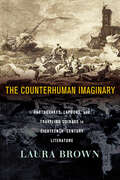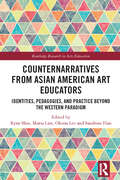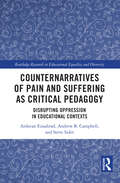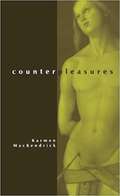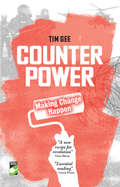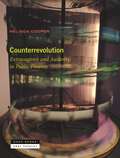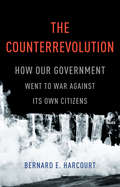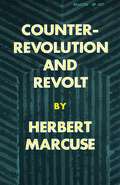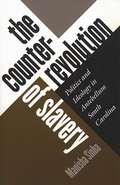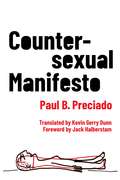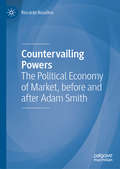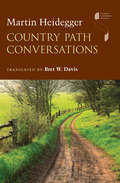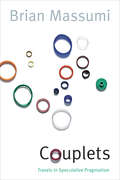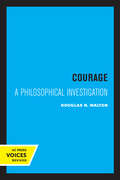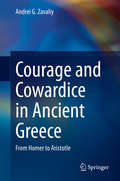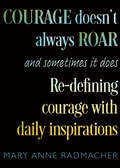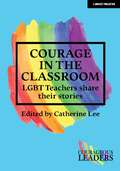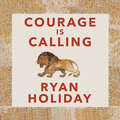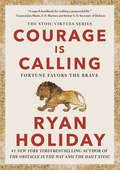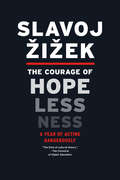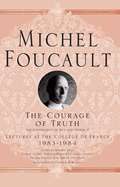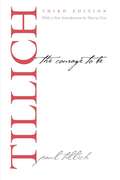- Table View
- List View
The Counterhuman Imaginary: Earthquakes, Lapdogs, and Traveling Coinage in Eighteenth-Century Literature
by Laura BrownThe Counterhuman Imaginary proposes that alongside the historical, social, and institutional structures of human reality that seem to be the sole subject of the literary text, an other-than-human world is everywhere in evidence. Laura Brown finds that within eighteenth-century British literature, the human cultural imaginary can be seen, equally, as a counterhuman imaginary—an alternative realm whose scope and terms exceed human understanding or order.Through close readings of works by Daniel Defoe, Jonathan Swift, and Alexander Pope, along with lapdog lyrics, circulation narratives that give agency to inanimate objects like coins and carriages, and poetry about the Lisbon earthquake of 1755, Brown traces the ways presence and power of the nonhuman—weather, natural disasters, animals, even the concept of love—not only influence human creativity, subjectivity, and history but are inseparable from them. Traversing literary theory, animal studies, new materialism, ecocriticism, and affect theory, The Counterhuman Imaginary offers an original repudiation of the centrality of the human to advance an integrative new methodology for reading chaos, fluidity, force, and impossibility in literary culture.
Counternarratives from Asian American Art Educators: Identities, Pedagogies, and Practice beyond the Western Paradigm (Routledge Research in Arts Education)
by Ryan Shin Maria Lim Oksun Lee Sandrine HanCounternarratives from Asian American Art Educators: Identities, Pedagogies, and Practice beyond the Western Paradigm collects and explores the professional and pedagogical narratives of Asian art educators and researchers in North America. Few studies published since the substantial immigration of Asian art educators to the US in the 1990s have addressed their professional identities in higher education, K-12, and museum contexts. By foregrounding narratives from Asian American arts educators within these settings, this edited volume enacts a critical shift from Western, Eurocentric perspectives to the unique contributions of Asian American practitioners. Enhanced by the application of the AsianCrit framework and theories of intersectionality, positionality, decolonization, and allyship, these original contributor counternarratives focus on professional and pedagogical discourses and practices that support Asian American identity development and practice. A significant contribution to the field of art education, this book highlights the voices and experiences of Asian art educators and serves as an ideal scholarly resource for exploring their identity formation, construction, and development of a historically underrepresented, minoritized group in North America.
Counternarratives from Asian American Art Educators: Identities, Pedagogies, and Practice beyond the Western Paradigm (Routledge Research in Arts Education)
by Ryan Shin Maria Lim Oksun Lee Sandrine HanCounternarratives from Asian American Art Educators: Identities, Pedagogies, and Practice beyond the Western Paradigm collects and explores the professional and pedagogical narratives of Asian art educators and researchers in North America. Few studies published since the substantial immigration of Asian art educators to the United States in the 1990s have addressed their professional identities in higher education, K-12, and museum contexts. By foregrounding narratives from Asian American arts educators within these settings, this edited volume enacts a critical shift from Western, Eurocentric perspectives to the unique contributions of Asian American practitioners.Enhanced by the application of the AsianCrit framework and theories of intersectionality, positionality, decolonization, and allyship, these original contributor counternarratives focus on professional and pedagogical discourses and practices that support Asian American identity development and practice. A significant contribution to the field of art education, this book highlights the voices and experiences of Asian art educators and serves as an ideal scholarly resource for exploring their identity formation, construction, and development of a historically underrepresented minoritized group in North America.
Counternarratives of Pain and Suffering as Critical Pedagogy: Disrupting Oppression in Educational Contexts (Routledge Research in Educational Equality and Diversity)
by Ardavan Eizadirad, Andrew B. Campbell, and Steve SiderForegrounding diverse lived experiences and non-dominant forms of knowledge, this edited volume showcases ways in which narrating and sharing stories of pain and suffering can be engaged as critical pedagogy to challenge oppression and inequity in educational contexts. The volume illustrates the need to consider both the act of narrating and the experience of bearing witness to narration to harness the full transformative potentials of counternarratives in disrupting oppressive practices. Chapters are divided into three parts: Telling and Reliving Trauma as Pedagogy, Pedagogies of Overcoming Silence, and Forgetting Pedagogy, illustrating a range of relational pedagogical and methodological approaches including journaling, poetry, and arts-based narrative inquiry. The authors make the argument that the language of pain and suffering is universal, hence its potential as critical pedagogy for transformative and therapeutic teaching and learning. Readers are encouraged to reflect their own lived experiences to constructively engage with their pain, suffering, and trauma. Focusing on trauma-informed non-hegemonic storytelling and transformative pedagogies, this volume will be of interest to students, faculty, scholars, and community members with an interest in advancing anti-oppressive and social justice education.
Counterpleasures (Suny Series In Postmodern Culture)
by Karmen MacKendrickCounterpleasures takes up a series of literary and physical pleasures that do not appear to be pleasurable, ranging from saintly asceticism to Sadean narrative to leathersex. Each is placed in its cultural context to unfold a history of transgressive pleasure and to argue for the value and power of such pleasures as resistant to more totalizing forms of power.
Counterpower
by Tim GeeThis timely book argues that no major movement has ever been successful without counterpower, or the power that the "have-nots" can use to remove the power of the "haves." Investigating the history and tactics of major movements of the past and today's global justice and human rights movements, Tim Gee demonstrates what works and what doesn't work. In showing how counterpower can be strategically applied, Gee has created an inspiration for activists and an invaluable resource for teachers and students of social change. Tim Gee is a writer and communications specialist working with campaigning organizations in the United Kingdom and worldwide.
Counterrevolution: Extravagance and Austerity in Public Finance
by Melinda CooperA thorough investigation of the current combination of austerity and extravagance that characterizes government spending and central bank monetary policyAt the close of the 1970s, government treasuries and central banks took a vow of perpetual self-restraint. To this day, fiscal authorities fret over soaring public debt burdens, while central bankers wring their hands at the slightest sign of rising wages. As the brief reprieve of coronavirus spending made clear, no departure from government austerity will be tolerated without a corresponding act of penance.Yet we misunderstand the scope of neoliberal public finance if we assume austerity to be its sole setting. Beyond the zero-sum game of direct claims on state budgets lies a realm of indirect government spending that escapes the naked eye. Capital gains are multiply subsidized by a tax system that reserves its greatest rewards for financial asset holders. And for all its airs of haughty asceticism, the Federal Reserve has become adept at facilitating the inflation of asset values while ruthlessly suppressing wages. Neoliberalism is as extravagant as it is austere, and this paradox needs to be grasped if we are to challenge its core modus operandi.Melinda Cooper examines the major schools of thought that have shaped neoliberal common sense around public finance. Focusing, in particular, on Virginia school public choice theory and supply-side economics, she shows how these currents produced distinct but ultimately complementary responses to the capitalist crisis of the 1970s. With its intellectual roots in the conservative Southern Democratic tradition, Virginia school public choice theory espoused an austere doctrine of budget balance. The supply-side movement, by contrast, advocated tax cuts without spending restraint and debt issuance without guilt, in an apparent repudiation of austerity. Yet, for all their differences, the two schools converged around the need to rein in the redistributive uses of public spending. Together, they drove a counterrevolution in public finance that deepened the divide between rich and poor and revived the fortunes of dynastic wealth.Far-reaching as the neoliberal counterrevolution has been, Cooper still identifies a counterfactual history of unrealized possibilities in the capitalist crisis of the 1970s. She concludes by inviting us to rethink the concept of revolution and raises the question: Is another politics of extravagance possible?
The Counterrevolution: How Our Government Went To War Against Its Own Citizens
by Bernard E. HarcourtA distinguished political theorist sounds the alarm about the counterinsurgency strategies used to govern AmericansMilitarized police officers with tanks and drones. Pervasive government surveillance and profiling. Social media that distract and track us. All of these, contends Bernard E. Harcourt, are facets of a new and radical governing paradigm in the United States--one rooted in the modes of warfare originally developed to suppress anticolonial revolutions and, more recently, to prosecute the war on terror.The Counterrevolution is a penetrating and disturbing account of the rise of counterinsurgency, first as a military strategy but increasingly as a way of ruling ordinary Americans. Harcourt shows how counterinsurgency's principles--bulk intelligence collection, ruthless targeting of minorities, pacifying propaganda--have taken hold domestically despite the absence of any radical uprising. This counterrevolution against phantom enemies, he argues, is the tyranny of our age. Seeing it clearly is the first step to resisting it effectively.
Counterrevolution and Revolt
by Herbert MarcuseIn this book Herbert Marcuse makes clear that capitalism is now reorganizing itself to meet the threat of a revolution that, if realized, would be the most radical of revolutions: the first truly world-historical revolution. Capitalism's counterrevolution, however, is largely preventive, and in the Western world altogether preventive. Yet capitalism is producing its own grave-diggers, and Marcuse suggests that their faces may be very different from those of the wretched of the earth. The future revolution will be characterized by its enlarged scope, for not only the economic and political structure, not only class relatoins, but also humanity's relation to nature (both human and external nature) tend toward radical transformation. For the author, the "liberation of nature" is the connecting thread between the economic-political and the cultural revolution, between "changing the world" and personal emancipation.
The Counterrevolution of Slavery
by Manisha SinhaIn this comprehensive analysis of politics and ideology in antebellum South Carolina, Manisha Sinha offers a provocative new look at the roots of southern separatism and the causes of the Civil War. Challenging works that portray secession as a fight for white liberty, she argues instead that it was a conservative, antidemocratic movement to protect and perpetuate racial slavery.Sinha discusses some of the major sectional crises of the antebellum era--including nullification, the conflict over the expansion of slavery into western territories, and secession--and offers an important reevaluation of the movement to reopen the African slave trade in the 1850s. In the process she reveals the central role played by South Carolina planter politicians in developing proslavery ideology and the use of states' rights and constitutional theory for the defense of slavery. Sinha's work underscores the necessity of integrating the history of slavery with the traditional narrative of southern politics. Only by taking into account the political importance of slavery, she insists, can we arrive at a complete understanding of southern politics and the enormity of the issues confronting both northerners and southerners on the eve of the Civil War.
Countersexual Manifesto (Critical Life Studies)
by Paul B. PreciadoCountersexual Manifesto is an outrageous yet rigorous work of trans theory, a performative literary text, and an insistent call to action. Seeking to overthrow all constraints on what can be done with and to the body, Paul B. Preciado offers a provocative challenge to even the most radical claims about gender, sexuality, and desire.Preciado lays out mock constitutional principles for a countersexual revolution that will recognize genitalia as technological objects and offers step-by-step illustrated instructions for dismantling the heterocentric social contract. He calls theorists such as Derrida, Foucault, Butler, and Haraway to task for not going nearly far enough in their attempts to deconstruct the naturalization of normative identities and behaviors. Preciado’s claim that the dildo precedes the penis—that artifice, not nature, comes first in the history of sexuality—forms the basis of his demand for new practices of sexual emancipation. He calls for a world of sexual plasticity and fabrication, of bio-printers and “dildonics,” and he invokes countersexuality’s roots in the history of sex toys, pornography, and drag in order to rupture the supposedly biological foundations of the heterocentric regime. His claims are extreme, but supported through meticulous readings of philosophy and theory, as well as popular culture. The Manifesto is now available in English translation for its twentieth anniversary, with a new introduction by Preciado. Countersexual Manifesto will disrupt feminism and queer theory and scandalize us all with its hyperbolic but deadly serious defiance of everything we’ve been told about sex.
Countervailing Powers: The Political Economy of Market, before and after Adam Smith
by Riccardo RosolinoThis book will trace the trajectory of the surprising idea that the victims of monopolistic conspiracies should be allowed to fight back using the same fraudulent and immoral weapons as the conspirators. In other words, if left to itself, the market will produce the antibodies necessary to survival, notwithstanding its most sinister pathology – the tendency of its principals to conclude private agreements behind the scenes.Originally conceived in a moral context halfway through the 16th century, the idea was then taken over by the world of commercial law in exactly the form it had been employed theologically. Surprisingly, though, after doing the rounds for over a century, it then disappeared without trace. This book will look at how Adam Smith revived and recharged the idea. He applied it in The Wealth of Nations (1776) to the conflict of interest between employers and workers in the attempt to break the stranglehold of the artificial compression of wages to minimum subsistence level. After Smith, the freshly revived idea went underground again for another half-century until, in the 1820s, it assumed a front-row position in the newborn liberal political economics. This book will look at how, in the framework of the debate over the repeal of the Combination Laws, the idea was dusted down and put back in the fight, having first been stripped it off its moral clothes and dressed instead in the new robes of economic pragmatism.
Country Path Conversations (Studies in Continental Thought)
by Martin HeideggerThe philosopher&’s meditations on nature, technology, and evil, written in the final years of WWII, presented in &“clear and highly readable translation&” (Philosophy in Review). First published in German in 1995, volume 77 of Heidegger&’s Complete Works consists of three imaginary conversations written as World War II was coming to an end. Composed at a crucial moment in history and in Heidegger&’s own thinking, these conversations present meditations on science and technology; the devastation of nature, World War II, and the nature of evil. Heidegger also delves into the possibility of release from representational thinking into a more authentic relation with being and the world. The first conversation involves a scientist, a scholar, and a guide walking together on a country path; the second takes place between a teacher and a tower-warden, and the third features a younger man and an older man in a prisoner-of-war camp in Russia, where Heidegger&’s two sons were missing in action. Unique because of their conversational style, this lucid and precise translation of these texts offers insight into the issues that engaged Heidegger&’s wartime and postwar thinking.
Coup d'État: A Practical Handbook, Revised Edition
by Edward N. LuttwakEdward Luttwak's shocking 1968 handbook showed, step-by-step, how governments could be overthrown and inspired anti-coup precautions around the world. In addition to these instructions, his revised handbook offers a new way of looking at political power--one that considers the vulnerability of stable democracies after prolonged economic distress.
Couplets: Travels in Speculative Pragmatism (Thought in the Act)
by Brian MassumiIn Couplets, Brian Massumi presents twenty-four essays that represent the full spectrum of his work during the past thirty years. Conceived as a companion volume to Parables for the Virtual, Couplets addresses the key concepts of Parables from different angles and contextualizes them, allowing their stakes to be more fully felt. Rather than organizing the essays chronologically or by topic, Massumi pairs them into couplets to encourage readers to make connections across conventional subject matter categories, to encounter disjunctions, and to link different phases in the evolution of his work. In his analyses of topics ranging from art, affect, and architecture to media theory, political theory, and the philosophy of experience, Massumi charts a field on which a family of conceptual problems plays out in ways that bear on the potentials for acting and perceiving the world. As an essential guide to Massumi's oeuvre, Couplets is both a primer for his new readers and a supplemental resource for those already engaged with his thought.
Courage: A Philosophical Investigation
by Douglas N. WaltonThis title is part of UC Press's Voices Revived program, which commemorates University of California Press’s mission to seek out and cultivate the brightest minds and give them voice, reach, and impact. Drawing on a backlist dating to 1893, Voices Revived makes high-quality, peer-reviewed scholarship accessible once again using print-on-demand technology. This title was originally published in 1986.
Courage and Cowardice in Ancient Greece: From Homer to Aristotle
by Andrei G. ZavaliyThe book offers the first comprehensive account of the debate on true courage as it was raging in ancient Greece, from the times when the immensely influential Homeric epics, the Iliad and the Odyssey, were composed, to the period of the equally influential author, Aristotle. The many voices that contribute to this debate include poets, authors of ancient dramas and comedies, historians, politicians and philosophers. The book traces the origin of the earliest ideal of a courageous hero in the epic poems of Homer (8th century BCE), and faithfully records its transformations in later authors, which range from an emphatic denial of the Homeric standards of courage (as in comedies of Aristophanes and some Dialogues of Plato) to the strong revisionist tendencies of Aristotle, who attempts to restore genuine courage to its traditional place as an exclusively martial, male virtue.Without attempting to cover the whole of the Western history, the book is able to explore the most important primary Greek sources on the subject matter in greater details, and provide the reader with a comprehensive picture of the changes in both popular and philosophical conceptualizations of the standards of courage from the Archaic period to the middle of the 4th century BCE. A deeper understanding of the history of the debate on courage should help to shape the modern discussions as well, as it becomes obvious that many of the questions on courage and cowardice that are still raised by the contemporary authors from different fields, have been thoroughly considered during the early stages of Greek culture. The book seeks to undermine a common stereotype of a single, unified view on courage and cowardice in Ancient Greece and shows that the current debates on what constitutes genuine courageous character can be traced to the various direct and indirect discussions on this subject matter by the ancient authorities.
Courage Doesn't Always Roar, and Sometimes It Does: Re-Defining Courage with Daily Inspirations
by Mary Anne RadmacherDiscover Your Inner Courage“Courage doesn't always roar. Sometimes courage is the quiet voice at the end of the day saying, 'I will try again tomorrow.'" —Mary Anne Rademacher#1 New Release in Humanist PhilosophyWritten initially as part of a longer poem and featured in a gallery show in 1985, these words by Mary Anne Rademacher defining courage have traveled the globe.Defining courage in a beloved quote. The quote has been featured in ceremonies of all sorts and included in sports and network news broadcasts. Oprah has included it in her magazine and journalists include it in “top ten” lists across many disciplines and categories. And, it is among the most beloved quotes on cards, posters, journals, and gift books.Bravery comes in many forms. Rademacher insists in her book that we overlook opportunities for growth and personal celebration by shrugging off courageous acts of perseverance with, “I just did what I felt I had to do.” Courage shows itself in many ways from having the courage to heal, to change habits, to learn and begin anew, or even to speak up for yourself.Defining courage with daily inspirations. This daily companion for women, men, or anyone who wants to change for good, and live a bolder, more courageous life may be the perfect addition to the start of your day or the key to letting go and ending your day right. Featuring an introduction from courage specialist, Candace Doby, Courage Doesn't Always Roar begins as an invitation to recognize all of the ways courage, and the associated risk, show up on ordinary days. Inside you’ll find:Keys to finding and defining courage in your everyday life180 entries covering all aspects of courage, like: resilience, thresholds, choices, grace, and moreMental health-friendly inspirations meant to shape the way you think about courageIf you liked Courage is Calling, Inward, or Designing the Mind, you’ll love Courage Doesn’t Always Roar.
Courage in the Classroom: Lgbt Teachers Share Their Stories
by Catherine LeeWe are all at our most effective when we can be ourselves at work, but more than half of LGBT teachers hide their sexual identity within their school workplace. For LGBT teachers, vigilance, concealment and assimilation, take a great deal of energy, on top of what is already a very demanding job. This book is essential reading for any LGBT teacher aspiring to succeed as their authentic self. It will also be of interest to Headteachers and other education leaders seeking to make their schools safe and inclusive workplaces for their LGBT staff and LGBT families. Based around the inspirational work of the Courageous Leaders programme, this book turns on its head the notion that it can be difficult to be a leader in school and be LGBT. Through personal testimonies, advice and a rousing call to arms, this book shows how LGBT School Leaders are often amongst the most inclusive, creative, adaptable and intuitive colleagues, when they are able to flourish and be their authentic selves.
Courage in the Classroom: Lgbt Teachers Share Their Stories
by Catherine LeeWe are all at our most effective when we can be ourselves at work, but more than half of LGBT teachers hide their sexual identity within their school workplace. For LGBT teachers, vigilance, concealment and assimilation, take a great deal of energy, on top of what is already a very demanding job. This book is essential reading for any LGBT teacher aspiring to succeed as their authentic self. It will also be of interest to Headteachers and other education leaders seeking to make their schools safe and inclusive workplaces for their LGBT staff and LGBT families. Based around the inspirational work of the Courageous Leaders programme, this book turns on its head the notion that it can be difficult to be a leader in school and be LGBT. Through personal testimonies, advice and a rousing call to arms, this book shows how LGBT School Leaders are often amongst the most inclusive, creative, adaptable and intuitive colleagues, when they are able to flourish and be their authentic selves.
Courage Is Calling: A Book About Bravery
by Ryan HolidayFortune favours the bold. All great leaders of history have known this, and were successful because of the risks they dared to take. But today so many of us are paralysed by fear.Drawing on ancient Stoic wisdom and examples across history and around the world, Ryan Holiday shows why courage is so important, and how to cultivate it in our own lives. Courage is not simply physical bravery but also doing the right thing and standing up for what you believe; it's creativity, generosity and perseverance. And it is the only way to live an extraordinary, fulfilled and effective life.Everything in life begins with courage. This book will equip you with the bravery to begin.
Courage Is Calling: Fortune Favors the Brave (The Stoic Virtues Series)
by Ryan HolidayThe instant New York Times, Wall Street Journal, and USA Today Bestseller! Ryan Holiday&’s bestselling trilogy—The Obstacle Is the Way, Ego is the Enemy, and Stillness is the Key—captivated professional athletes, CEOs, politicians, and entrepreneurs and helped bring Stoicism to millions of readers. Now, in the first book of an exciting new series on the cardinal virtues of ancient philosophy, Holiday explores the most foundational virtue of all: Courage.Almost every religion, spiritual practice, philosophy and person grapples with fear. The most repeated phrase in the Bible is &“Be not afraid.&” The ancient Greeks spoke of phobos, panic and terror. It is natural to feel fear, the Stoics believed, but it cannot rule you. Courage, then, is the ability to rise above fear, to do what&’s right, to do what&’s needed, to do what is true. And so it rests at the heart of the works of Marcus Aurelius, Aristotle, and CS Lewis, alongside temperance, justice, and wisdom. In Courage Is Calling, Ryan Holiday breaks down the elements of fear, an expression of cowardice, the elements of courage, an expression of bravery, and lastly, the elements of heroism, an expression of valor. Through engaging stories about historic and contemporary leaders, including Charles De Gaulle, Florence Nightingale, and Dr. Martin Luther King Jr., Holiday shows you how to conquer fear and practice courage in your daily life. You&’ll also delve deep into the moral dilemmas and courageous acts of lesser-known, but equally as important, figures from ancient and modern history, such as Helvidius Priscus, a Roman Senator who stood his ground against emperor Vespasian, even in the face of death; Frank Serpico, a former New York City Police Department Detective who exposed police corruption; and Frederick Douglass and a slave named Nelly, whose fierce resistance against her captors inspired his own crusade to end slavery. In a world in which fear runs rampant—when people would rather stand on the sidelines than speak out against injustice, go along with convention than bet on themselves, and turn a blind eye to the ugly realities of modern life—we need courage more than ever. We need the courage of whistleblowers and risk takers. We need the courage of activists and adventurers. We need the courage of writers who speak the truth—and the courage of leaders to listen. We need you to step into the arena and fight.
The Courage of Hopelessness: Chronicles Of A Year Of Acting Dangerously
by Slavoj ZizekIn THE COURAGE OF HOPELESSNESS, maverick philosopher Slavoj Zizek returns to explore today's ideological, political and economic battles, and asks whether radical change is possible.In these troubled times, even the most pessimistic diagnosis of our future ends with an uplifting hint that things might not be as bad as all that, that there is light at the end of the tunnel. Yet, argues Slavoj Žižek, it is only when we have admitted to ourselves that our situation is completely hopeless - that the light at the end of the tunnel is in fact the headlight of a train - that fundamental change can be brought about.
The Courage of Truth (Michel Foucault, Lectures at the Collège de France)
by Michel Foucault Graham BurchellThe Courage of the Truth is the last course that Michel Foucault delivered at the College de France before his death in 1984. In this course, he continues the theme of the previous year's lectures in exploring the notion of "truth-telling" in politics to establish a number of ethically irreducible conditionsbased on courage and conviction.
The Courage to Be
by Paul TillichThe Courage to Be has become a classic of twentieth-century religious and philosophical thought. The great Christian existentialist thinker Paul Tillich describes the dilemma of modern man and points a way to the conquest of the problem of anxiety.
